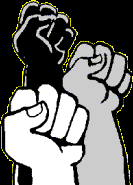
A Shift to the Left in Latin American Elections

by SA Editors / November 2006 issue of Socialist Action Newspaper
http://www.socialistaction.org/editors9.htm

A Shift to the Left in Latin American Elections

by SA Editors / November 2006 issue of Socialist Action Newspaper
http://www.socialistaction.org/editors9.htm
How should revolutionists respond to the current electoral shift to the left in Latin America? A series of elections in Latin America—including Brazil, Nicaragua and Venezuela—have led or are expected to lead to victories of left or neopopulist candidates. The most polarized vote will undoubtedly be in Venezuela on Dec. 3.
All of these cases reflect a rejection of the right-wing economic policies and capitulation to imperialism that have devastated the region in the past 20 years and longer. They all reflect a general turn to the left on the part of the masses and anger against imperialism. To that extent, this process is positive and promising.
However, none of these populist candidates and parties is either consistently socialist or based on the organization and education of the working class to take power. And therefore they pose the danger of deflecting or dissipating the mass radicalization that has been developing.
That includes the Hugo Chavez regime in Venezuela, which is the most radical of them. Chavez's party, the Movement for the Fifth Republic, is a typical populist formation—electoralist and multi-class—which makes little effort to politically organize the workers and poor of the country.
Hugo Chavez himself—although he has made promising statements in support of socialism, as well as strong denunciations of U.S. imperialism, and instituted a number of government programs that benefit the poor masses—has not mounted any fundamental attack on the capitalist system as such, although he has been in office for almost a decade.
We defend the democratic right of these populist and reformist figures to assume office, as in the recent presidential election in Mexico, when they are popularly elected and when right-wing elements seek to negate their electoral victories by fraud or brute force. We also defend them against all slanders and attacks by the local bourgeoisies and imperialism.
But we do not give them political confidence and therefore do not call for a vote for them in elections to determine the political leadership of the countries concerned. A long and tragic history of failed reformist experiments in Latin America demonstrates the dangers of relying on such figures and political formations.
There is hope that the present process of radicalization will lead to a real change in the situation of the poor masses and that of the countries dominated by imperialism. But significant change will only happen when the masses in these countries become dissatisfied with populist rhetoric and half-way measures and refuse to be diverted from the perspective of independent organization and socialist revolution.
Therefore, revolutionary socialists have no interest in fostering illusions in politicians who have no such revolutionary perspectives.
One of the populist figures in whom the most hopes were placed was Luis Ignacio "Lula" da Silva in Brazil, who had been a leader of a radical trade-union movement and the bogeyman of the bourgeoisie. However, to win an electoral victory, Lula capitulated to the capitalists, taking a direct representative of the capitalist class as his running mate. And in office, he has followed a basically neoliberal (or pro-capitalist) agenda with some concessions to greater social welfare.
Therefore, a large section of those who had hoped that Lula would lead radical change broke from his party and ran against him in the recent elections. The most well known left candidate, Heloisa Helena, got more than 6 million votes nationally and 17 percent of the total vote in the strategic state of Rio de Janeiro.
She and her party did not even call for a critical vote for Lula in the run-off election, arguing—correctly, in our view—that there was no essential difference between him and his right-wing opponent. It is symptomatic, with regard to Hugo Chavez, that he supported a vote for Lula and criticized the left for creating divisions by not backing Lula. This is a telling indication of Chavez’s political perspectives.
In Nicaragua, as we go to press, former FSLN guerrilla leader and elected president Daniel Ortega has won the presidential election. But in order to achieve an electoral victory, he has dumped all revolutionary perspectives and even the progressive measures that were instituted under the previous Sandinista government.
Therefore, Ortega’s election is a double-edged sword. It reflects both capitulation to bourgeois pressures and a broad popular reaction against the failures of the capitalist economic policies that have been followed since the ouster of the Sandinista government. We can hope that the vote for Ortega represents a shift of the masses to the left, but to call for a vote for him would mean giving support to his surrender of revolutionary and working-class political principles.